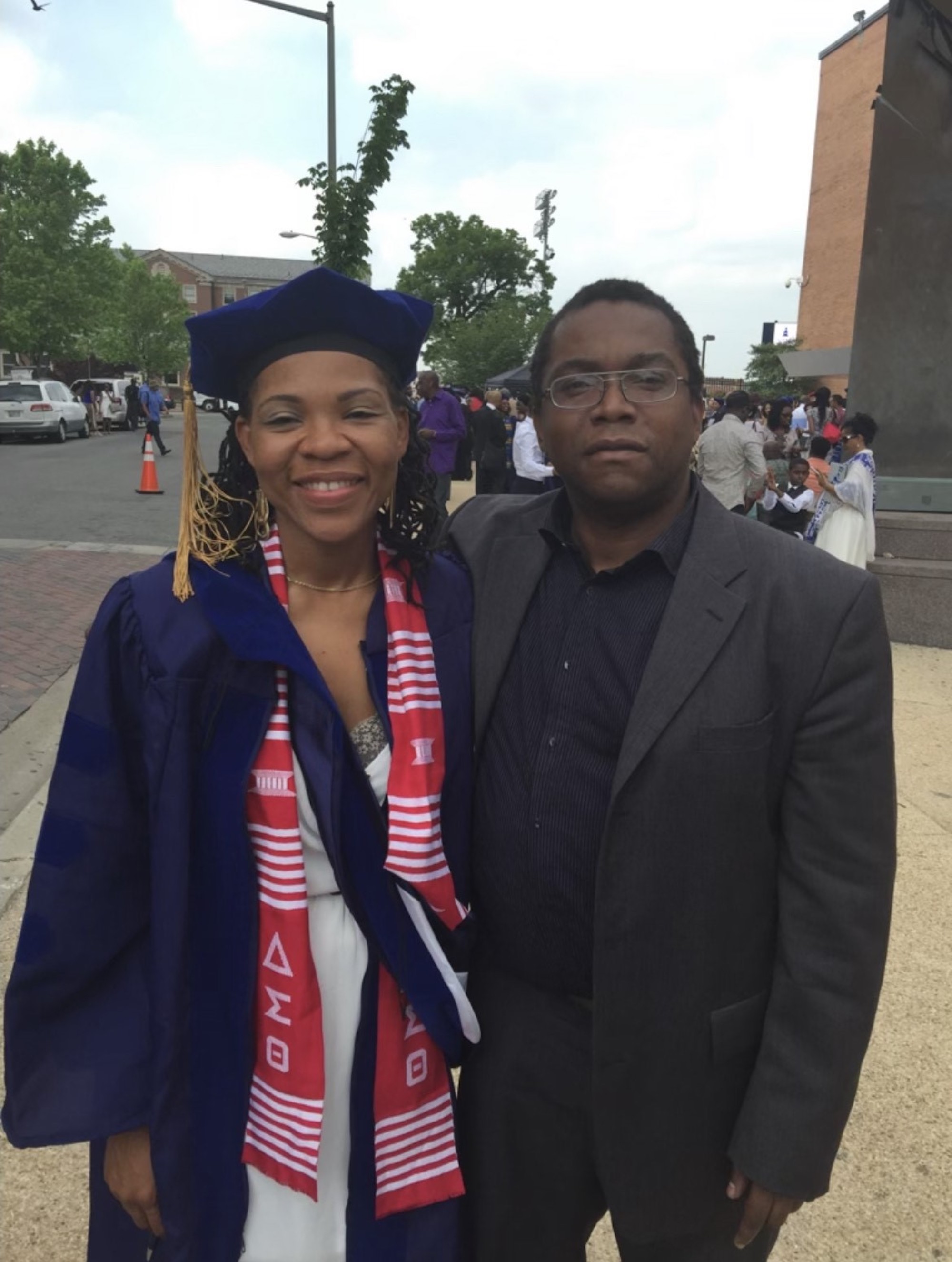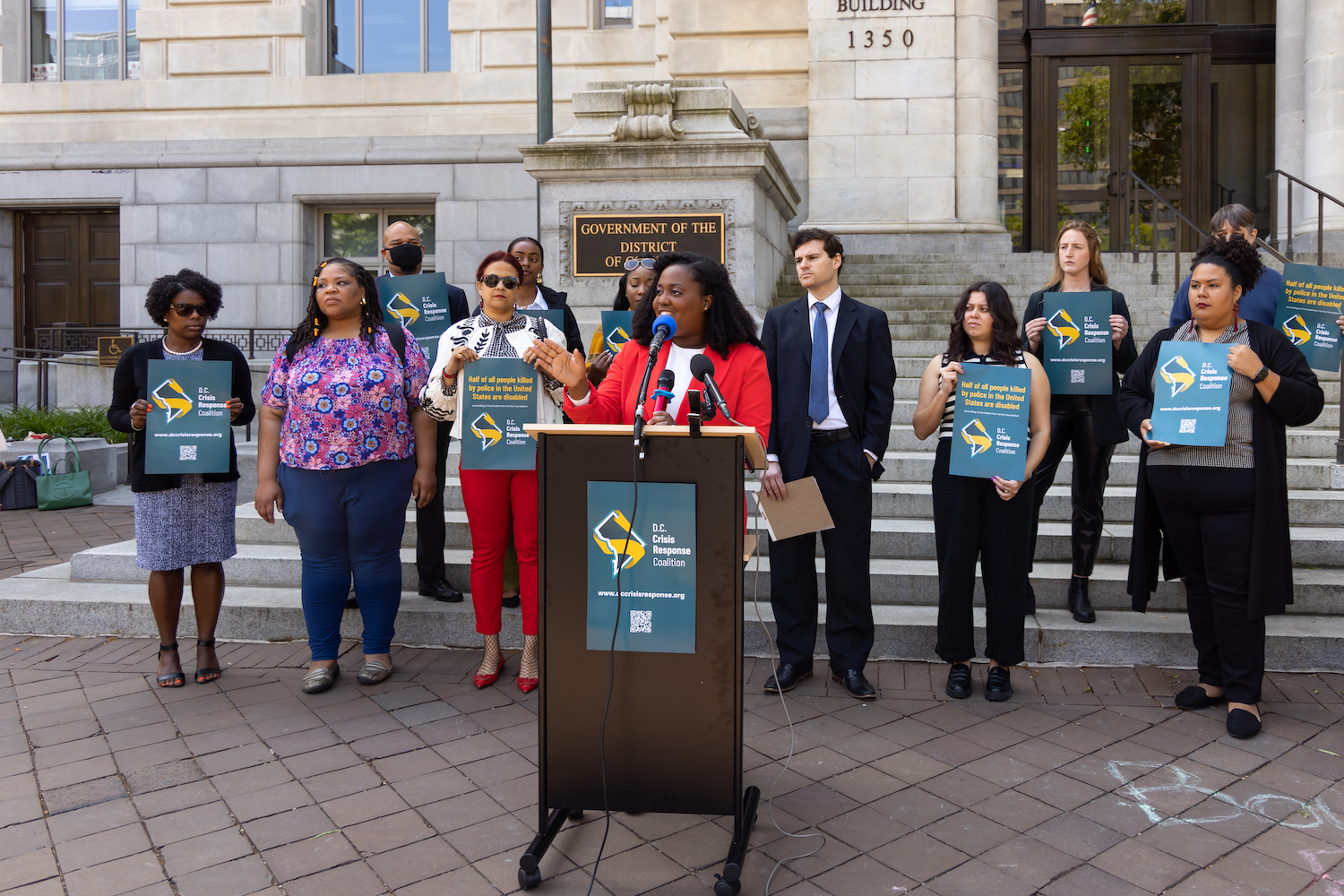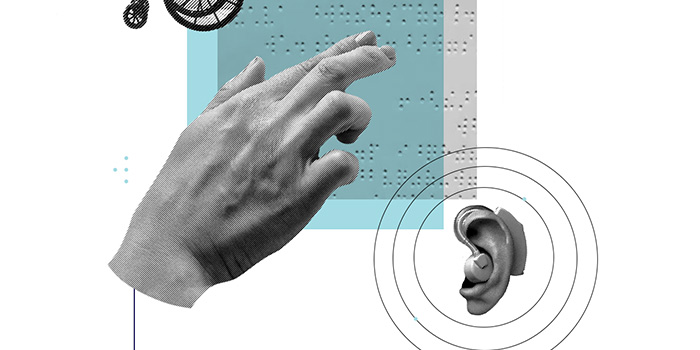
Ezenwa Oruh was a creative spirit who loved storytelling and was pursuing his dream of being an actor. He was a wonderful uncle to his sister Chioma Oruh’s two children, who are both autistic. Ezenwa also had schizophrenia, and would sometimes become dysregulated and disoriented. Sometimes, his family would have to call 911 for help. They knew the responders would be police, but they had no other option.
“When the police come on site oftentimes — whether it’s for my brother, or the children that I birthed, or other children in the community that go through these crises — the last thing on the mind of a first responder is that these children are brilliant, that they’re loved, that they have gifts, that they offer things to the community,” said Chioma. “The problem is not their family or their condition, but it’s about how the system responds to them and their condition and their loved ones who only seek and want help.”

Chioma and Ezenwa Oruh
Credit : Chioma Oruh
Chioma is one of many Washingtonians for whom the shortcomings of D.C.’s crisis response system, in which police are the default responders for mental and behavioral health crises, hit close to home. Her brother had several emergencies that invariably resulted in police transporting him to the hospital, where he was released shortly after his admission without meaningful treatment and with new traumas of mistreatment by police.
Last year, Ezenwa died. Chioma believes that the repeat encounters with police her brother faced are symptomatic of unequal and unjust social services and medical systems, helmed by an overworked and burnt-out mental health workforce. The presence of police as first responders to mental health crisis calls, she says, are the cumulative result of Ezenwa’s unmet mental health needs. The frequent encounters with police Chioma witnessed and intervened in as a caregiver for her brother were unfortunately a training ground for the frequent police encounters that both her autistic children have endured since they were toddlers.
Following the loss of her brother, Chioma came together with her community to change the city’s crisis response system.
Back in 2019, the ACLU of D.C.’s policy and organizing team formed a small working group to discuss the state of crisis response in the District with local leaders and partners. Community members residing east of the Anacostia River, faith leaders, mutual aid organizers, direct service providers, and public health experts came together to decide if the people of D.C. had the capacity and interest to push for a stronger crisis response system. In 2022, members of this group formed the D.C. Crisis Response Coalition.
The D.C. Crisis Response Coalition’s Theory of Change
The intention of this critical work is to make this a truly community-led effort and bring to the table the expertise of impacted community members first and foremost. Power building is not only essential to the campaign, but is truly the life force of this work.
Through many dialogues over the course of late 2022 and early 2023, the vision for a robust crisis response system in the District became clearer, and we developed our coalition’s platform.
We believe:
- The District’s response to those experiencing mental health crises must center a public health approach with a crisis call center staffed with adequately trained and resourced mental health professionals and services. Police are not equipped or trained for crisis response, nor should they be.
- The District must invest in a crisis response system that is trauma-informed, culturally competent, and inclusive to promote genuine community safety, comprehensive care, and collective well-being. D.C. needs mental health professionals who can respond to emergencies without police and address crises that the call center cannot resolve telephonically.
- Black, Latine, disabled, and senior community members must be connected with the health and wellbeing resources and crisis-receiving centers equipped to address their individual needs during a crisis and connect residents with post-crisis care.
How We Got Here
National experts, federal experts, and the evidence are clear and aligned with the coalition’s position: Police officers aren’t the right people to respond to mental health crises, nor should they be.
Even though the vast majority of people with mental health disabilities are not violent and most people who are violent do not have identifiable mental health disabilities, police nationwide are 11.6 times more likely to use force against people with serious mental health disabilities than other individuals, and 16 times more likely to kill people with untreated mental health disabilities than other individuals. More than half of disabled Black people have been arrested by the time they turn 28 — double the risk of their white disabled peers.
The U.S. Department of Justice has found in multiple investigations that municipalities violate federal disability law by relying on police as the primary first responders for addressing mental health emergencies. The Substance Abuse and Mental Health Services Administration — the federal agency responsible for mental health — concluded in its national guidelines for behavioral health crisis care that it is “unacceptable and unsafe” for local law enforcement to serve as a community’s de facto mental health crisis first responders.

Credit: TELLYSVISION
Our coalition and allied groups have spoken out against the use of police in crisis response, finding that relying on MPD officers as crisis responders is a fundamental misuse of law enforcement resources and recommending that mental health professionals be the default responders for most mental health emergencies in the District.
Between October 2021 and September 2022, the District dispatched a mental health professional to less than 1 percent of the 911 calls the District received that primarily or exclusively involved mental health emergencies. This was despite the District having mental health clinicians and certified peer support specialists available on its Community Response Teams (CRTs). In contrast, 90 percent of 911 calls related to physical health emergencies during the same year got a response from an EMT or paramedic.
How We’re Taking Action
To support the community’s demands and advocacy, the ACLU and the ACLU of D.C. filed a lawsuit last month challenging the discriminatory crisis response system in Washington D.C. We argue that the disparity between D.C.’s response to physical health emergencies and its response to mental health emergencies is so stark that it violates the Americans with Disabilities Act.
The District has invested the necessary resources to ensure that people experiencing physical health emergencies receive a response from a professional who can assess, stabilize, and if necessary transport the individual to specialized care. But there is no parallel and equivalent system for people who have mental health emergencies.
For example, while the District has hired 1,600 EMTs — 300 of whom are also paramedics (more highly-trained medical professionals) — to respond to physical health emergencies, the District has hired only 44 CRT staff. This understaffing has resulted in response times for CRTs ranging from one to more than three hours, compared to a benchmark of just five minutes for EMT response or nine minutes for paramedic response.
Instead, the District’s policy and practice is to send armed MPD officers to mental health crises, who are not mental health professionals trained to assess, stabilize, and if necessary transport to specialized care. In fact, because many mental health crises are trauma-based, police may make the situation worse. This unequal and discriminatory response violates the Americans with Disabilities Act.
Looking ahead, the coalition will push the D.C. Council and Mayor Bowser to restructure D.C.’s crisis response system. The litigation team will be doing the same in federal court. Together, we hope to achieve a reality in which any District resident can call 911 during a mental health crisis, and Community Response Teams will arrive, equipped with the training and knowledge to help.
Together, we hope to achieve a reality in which any District resident can call 911 during a mental health crisis, and Community Response Teams will arrive, equipped with the training and knowledge to help.
D.C.’s residents are far from alone in this work. There are many other communities actively organizing to make systems of crisis response and care better in their communities. Together, we can move closer to a future where people with mental health disabilities can live freely in our communities alongside their friends and family members, without fear of experiencing harm at the hands of the wrong crisis responder.

Comments
Post a Comment